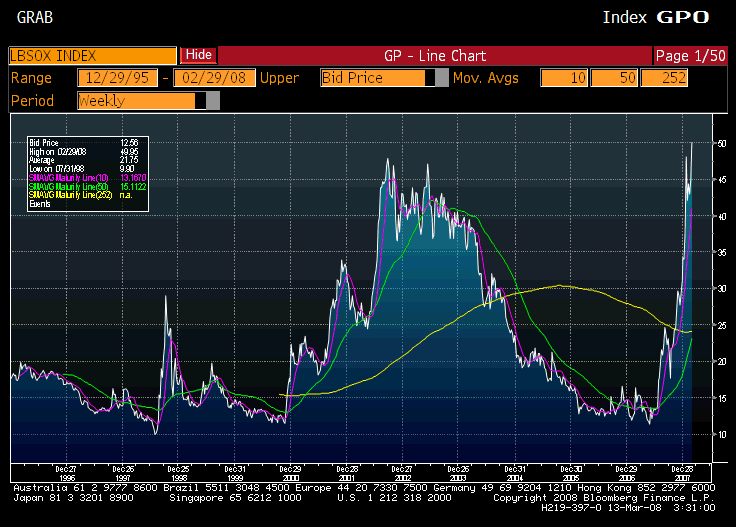Mark-to-Market Accounting Is not the Major Problem
I?m not a fan of mark-to-market accounting, partially due to the loss of comparability across firms. It introduces a level of flexibility that can be gamed by the unscrupulous. That said, any accounting method can be gamed. Accounting attempts to assign the value of economic activity at and across points in time.
Now, with financial firms, there are typically several accounting bases going on at the same time. There?s GAAP, Regulatory, Tax, and then the accounting for special agreements, which may be different than any of the three major accounting bases.
Why has mark-to-market come up as an issue recently? Because it has seemingly created downside volatility in the financial statements, leading investors to panic, which pushes down security prices.
In my opinion, the greater problems are how a firm finances itself, how it is regulated, and negative optionality in its assets and positive optionality in its liabilities. I?ll give some examples to illustrate:
With Thornburg, the problem was over-reliance on short-term lending to finance long term assets. It doesn?t matter how you do the GAAP accounting here. The brokers will look at the day-to-day market value of the positions versus the capital supporting them. If the capital becomes insufficient to carry the position, the positions will be liquidated. Given that there were a lot of players with similar trades, and funding in the repo market, that created an ideal setup for the most levered to lose a lot as financing dried up.
Bear Stearns also relied on short-term financing. Bear ran with high leverage that made them vulnerable to attacks from those that bought credit protection in the credit default swap market? as those spreads went up, the willingness to extend credit went down. Ratings downgrades pushed up, and in some cases eliminated the willingness of lenders to extend short term credit. (Bear also lacked friends to help them in their time of need, a payoff for not helping on LTCM. Lehman had similar leverage, but the Street supports it.) Also, derivative agreements often specify a need for more collateral if downgrades occur, which is exactly the wrong time to have to provide more collateral. Again, this has nothing to do with GAAP accounting, but it has a lot to do with positive optionality in the liabilities of the firm. (I.e., the liability can get more onerous under conditions of stress.)
Consider PXRE, which recently merged with Argonaut Group. When the storms of 2005 hit, they claims against them were bad enough, but many of their reinsurance agreements had downgrade clauses, saying they would have to post collateral. Though it didn?t bankrupt them, it could have, and they had to find a buyer. Nothing to do with GAAP accounting.
General American wrote a bunch of floating rate Guaranteed Investment Contracts that had 7-day put provisions after a ratings downgrade. They wrote so much of them, that they comprised 25% of their liability structure. When they got downgraded, they could not meet the call on liquidity. They wen insolvent. Nothing to do with GAAP accounting.
CIT got downgraded and drew down their revolver because of a liquidity shortfall. The stock has fallen more then 80% in the past year. Mark-to-market accounting to blame? No, deteriorating assets and too much short-term financing.
I could go on. Regulators are under no obligation to use mark-to-market accounting, and they can set capital levels as they please. Optimally, regulators should look at risk based liquidity. How likely is it that a financial firm will have adequate liquidity in all circumstances? How safe and liquid are the assets? Is the liability structure long enough to support them? Can the liability structure dramatically shorten? (I.e., a run on the bank.)
Deterioration in the value of assets has to be addressed by accounting somehow. But regardless of the method, those that finance the company will look beyond the published GAAP financials, and will look at the cash generation capacity of the firm over the life of the loan, and how prone to change that could be. Even if a firm could take an asset worth 80 cents and mark it at $1.00, the sophisticated lenders would only assign 80 cents of value.
Along with The Analyst?s Accounting Observer, I don?t see mark-to-market accounting as a major threat to the solvency of firms. The companies that have gotten into trouble recently have held assets of dubious quality, and have financed themselves with too much leverage, borrowing short-term, and/or implicitly sold short options against their firms that weakened themselves during a crisis. Dodgy assets and liquid liabilities are poisonous to any firm, regardless of the accounting method.


